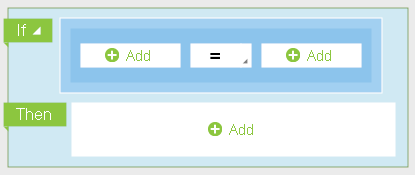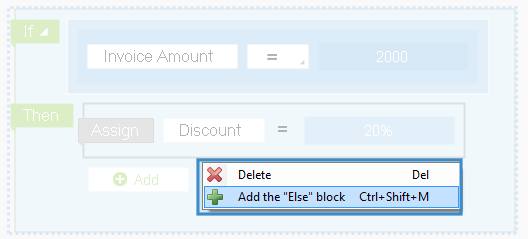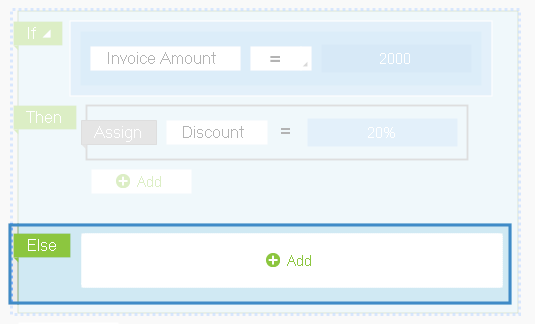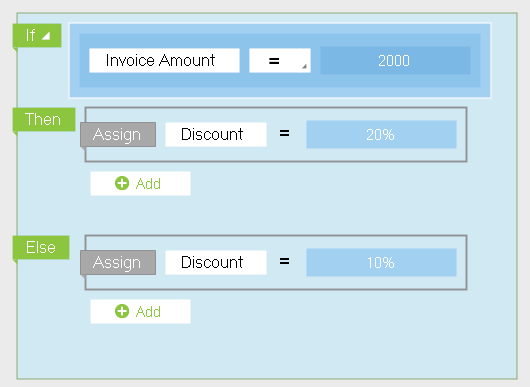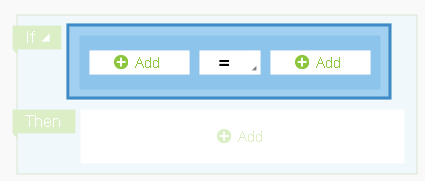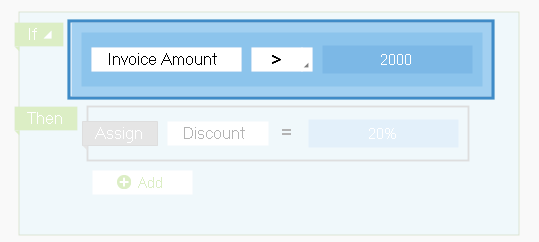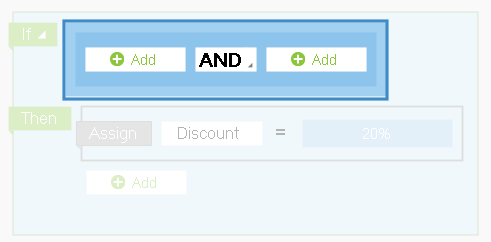Operations used in Script Builder
In Script Builder, scripts are created with specially designed graphic elements called operations. Only the following operations can be added directly to the work pane of Script Builder:
The rest of the operations can be used only within other operations.
Assign Value
This operation assigns a specific value (number, string, date, etc.) to a variable. The assigned value depends on the variable type. You can see an example of this operation in Fig. 1.
|
|
|
Fig. 1. Assign Value operation block
|
In the first selection box, select the variable, to which you want to assign a value. In the second selection box select/enter the value.
You can see an example of this operation in Fig. 2.
|
|
|
Fig. 2. Example of using the Assign Value operation
|
If
The If operation is used when you need to verify a certain condition and then take the next step according to the returned result. Fig. 3 shows an example of this operation.
If – in this box the condition is checked. To check the condition, use the Condition and/or the OR and AND operations.
Then – in this box you have to specify the operation, which must be executed if the above mentioned condition is met.
To specify the operation, which is executed if the above mentioned conditions is not met, use the Else function. There are two ways to add it:
-
right-click inside the If operation box and select Add the "Else" block option (Fig. 4);
|
|
|
Fig. 4. Context menu of the "If" block. Add the "Else" block option
|
The Else function will be added to the If box (Fig. 5).
|
|
|
Fig. 5. If operation block with the added Else function
|
Fig. 6 features an example of how this operation is used.
|
|
|
Fig. 6. Example of using the "If" operation
|
Condition
This operation is used to record the condition checked in the If operation. It can only be used in the If operation box of the If operation. In Fig. 7 you can see an example of this operation:
|
|
|
Fig. 7. Condition operation block
|
In the first and third selection boxes you have to specify the variable/exact value/mathematical operator/condition. In the second selection box, open the drop-down list and select the condition for comparison (=, ≠, >, <, ≥, ≤) of the first and third field.
Fig. 8 features an example of how this operation is used
|
|
|
Fig. 8. Example of using the Condition operation
|
OR and AND
This operation is used to test several conditions. It can only be used in the If operation box of the If operation. In Fig. 9 you can see an example of this operation.
|
|
|
Fig. 9. OR and AND operation box
|
This operation has 3 fields: two selection boxes where you have to specify the Condition or the OR and AND operation, and one box to select the type of operation:
-
AND – this type of operation is used when both conditions are required to perform the action specified in the То field of the If operation;
-
OR – this type of operation is used when at least one of the conditions is required to perform the action specified in the То field of the If operation.
Fig. 10 features an example of how this operation is used.
|
|
|
Fig. 10. Example of using the OR and AND operation
|
Mathematical Operators
This operation is used to perform the following mathematical operations: addition, subtraction, multiplication, division. This operation can be used:
Fig. 11 shows an example of this operation's box.
|
|
|
Рис. 11. Mathematical Operators operation box
|
In the first and third selection boxes you have to specify the variable, mathematical operator or exact value.
In the second selection box, select the type of the mathematical operation you want to use: addition, subtraction, multiplication or division.
Fig. 12 features an example of how this operation is used.
|
|
|
Fig. 12. Example of using Mathematical Operators
|
Exact Value
This operation is used to assign an exact value (number, string, date, etc.) to a variable. The assigned value depends on the type of the variable, to which the value is assigned.
This operation can be used:
Fig. 13 shows an example of this operation's box.
|
|
|
Fig. 13. Exact Value operation box
|
This operation has only one box, where you enter the value. The value depends on the type of the variable, to which it is assigned.
Fig. 13 shows an example of this operation.
|
|
|
Fig. 14. Example of using the Exact Value operation
|
Repeat
This operation is used when a certain action has to be performed a specific number of times, or if it must be performed for each instance specified in the first selection box (for example, for each version of a document).
Fig. 15 shows an example of this operation.
|
|
|
Fig. 15. Cycle operation box
|
In the first box, specify a variable. The operation specified in the second field is repeated according to this variable.
If the variable is of the Integer type, it defines how many times the operation is repeated. The Platform Objects type (List type of link) repeats the action for each instance of the selected object. In this case, the block name will change to Repeat for each (Fig. 16).
In the second box, select the operation that you want to execute.
Copyright © 2006–2019 ELMA



